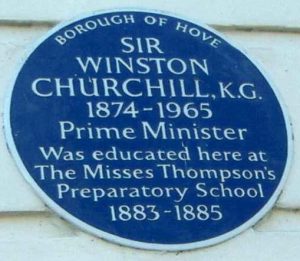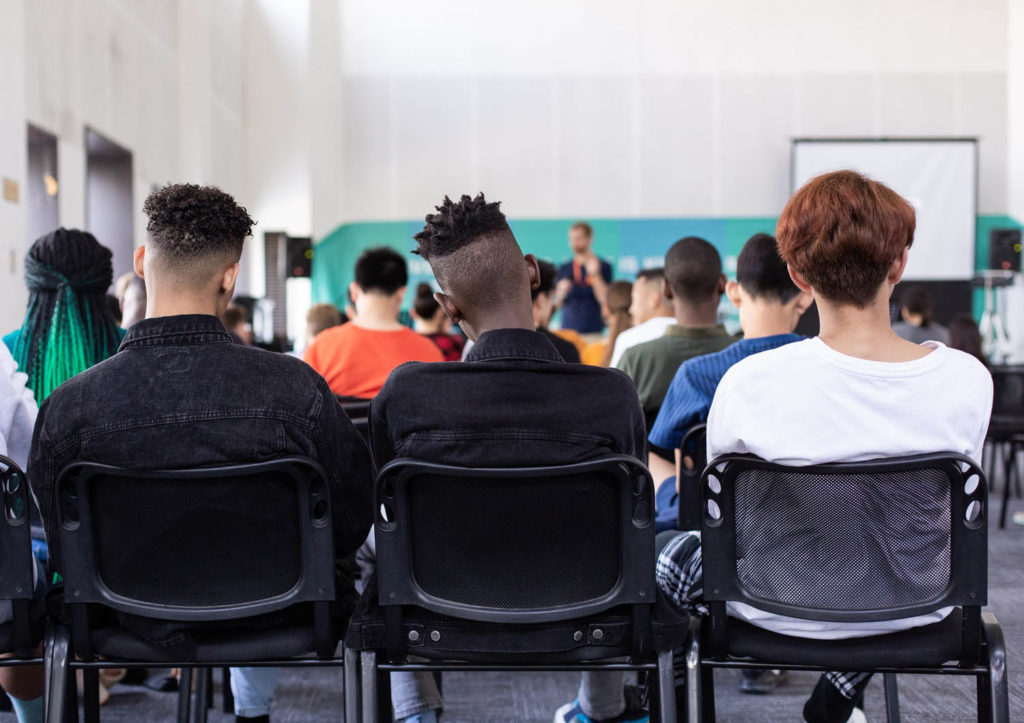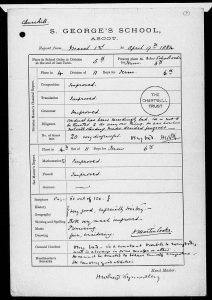
For Educators
Topical and Essential Questions

January 7, 2013
The study of Winston S.Churchill (1874-1965), while always edifying, also compels the serious student to weigh, analyze and compare the various elements of his political philosophy and values. Programs offered to teachers, graduate students and undergraduates must help place Churchill in larger contexts, both historically and philosophically. Only then can he be integrated into a wider view. Because the study of Churchill’s life and times encourages reflection on important pedagogical, historical and political questions, it is important to identify, as examples, several of the overarching and essential questions one might confront in the reading and contemplation of Churchill.
“Essential questions” is a term applied to curriculum development as conceived by Grant Wiggins and Jay McTighe in their seminal work Understanding by Design (Pearson, Merrill, Prentice Hall, 2006). Such questions clearly explain the relevance of learning about Churchill and through Churchill. He may serve as both the topic and the means to “broader, transferable understandings.”
The more general essential questions, however, take us beyond any particular topic or skill; they point toward the more general, transferable understandings. They do not refer to topic content but to the big ideas that cut across units and courses.
Understanding by Design, p 114
Below are examples of both topical (T) and essential (E) questions and, in some instances, a comment by Churchill. In addition to exploring Churchill’s role in history, an educational program about Churchill should prompt reflection on his application to larger questions.

2025 International Churchill Conference
Topical and Essential Questions
1. After reading Churchill’s My Early Life (T), discuss the strengths and limitations of autobiography as a source of information. What can’t the writer of an autobiography see? What can the writer see that others cannot? (E)
2. What are Churchill’s thoughts on human nature? (T) What is human nature? (E)
“The nature of man has remained hitherto practically unchanged.”
3. How would you describe Churchill’s childhood? (T) Are childhood experiences genuinely formative? (E) What is the evidence?
“Our preparations were by no means completed when the fateful hour struck and the Governess was due to arrive. I did what so many oppressed peoples have done in similar circumstances: I took to the woods. I hid in the extensive shrubberies . . .” (1930)
4. What are the strengths and weaknesses of the kind of “traditional” education (for the times) that Churchill experienced? What did he gain from his formal education and how far was he self-taught? (T) What is the ideal education? (E)
“The empires of the future are the empires of the mind.”
5. Who influenced Churchill’s life and thought? (T) How might one identify the key influences on the life of a historical figure? (E) Is it important to do so? Why or why not?
“Almost the chief mystery of life is what makes one do things.” (1931)
6. Was Churchill an indispensable leader in 1940? (T) Is it possible for an individual to change the course of major events? How? (E)
“Is history the chronicle of famous men and women, or only of their responses to the tides, tendencies and opportunities of their age?”
7. How does Churchill define freedom? (T) How free should individuals be? (E)
“Many forms of Government have been tried, and will be tried in this world of sin and woe.”
8. What is democracy? (E) Are there differences between the American republic and a democracy? (E). What are the strengths and shortcomings of a democratic system of government? (E)
“Indeed it has been said that democracy is the worst form of Government except for all those other forms that have been tried from time to time …”
9. Does Churchill value scientific and technological progress? (T) Is scientific progress a force for good? (E) Has our progress in science and technology been matched by progress in morals and statesmanship? (E)
“Certain it is that while men are gathering knowledge and power with ever-increasing and measureless speed, their virtues and their wisdom have not shown any notable improvement as the centuries have rolled.”
10. Was Churchill a good prime minister? (T) What is a statesman and what is his or her role? (E)
“There is only one duty, only one safe course, and that is to try to be right and not to fear to do or to say what you believe to be right.” (1941)
“A statesman should always try to do what he believes is best in the long view for his country, and he should not be dissuaded from so acting by having to divorce himself from a great body of doctrine to which he formerly sincerely adhered.” (1927)
11. Why did Churchill cross the floor to join the Liberals in 1904? (T) What is the purpose of trade and how “free” should it be? (E)
“Will the shutting out of foreign goods increase the total amount of wealth in this country?” (1904)
12. Why did Churchill say, “Anyone can rat, but it takes a certain amount of ingenuity to re-rat”? To which political parties did Churchill belong and when? (T) What are the pros and cons of political parties and other groups of politically motivated voters? (E)
“Much might be said for and against the two-Party system. But no one can doubt that it adds to the stability and cohesion of the State. The alternation of Parties in power, like the rotation of crops, has beneficial results. Each of the two Parties has services to render in the development of the national life; and the succession of new and different points of view is a real benefit to the country.” (1907)
“He [Kinsley Wood] was also a good party man. There is no reason to be ashamed of that, for in many periods of history, democracy expresses itself best through the ebb and flow of parties. He was a good party man in this sense, because these are the qualifications of a good party man – you must know how to put your party before yourself, and you must know the occasions when to put nation before party.” (1943) (In the House of Commons, on the death of Sir Kingsley Wood, Chancellor of the Exchequer)
13. Did Churchill effectively use the English language? (T) Does a shared language effect communications within a country? (E) Among countries?
“And what a noble medium the English language is. It is not possible to write a page without experiencing positive pleasure at the richness and variety, the flexibility and the profoundness of our mother-tongue.” (1905)
14. During the 1930s, how effective were the speeches Churchill broadcast to America? (T) Should citizens listen to leaders of other countries? If so, in what context? (E) Are our often-mentioned expanded global sensibilities and communication a change from Churchill’s era?
“At intervals during the last forty years I have addressed scores of great American audiences in almost every part of the Union.” (1941)
15. What did Churchill think of the League of Nations and the United Nations? (T) Are international organizations (League of Nations, United Nations, etc.) effective? (E) Why or why not?
“It is said that the League of Nations failed. If so, that is largely because it was abandoned, and later on betrayed; . . .” (1943)
“The story of the human race is war.” (E) Evaluate Churchill’s assertion.
16. Was Churchill a warmonger in the 1930s? What is a warmonger? (T) What is the relationship between disarmament, peace and war? (E)
“I could not see how better you can prevent war than by confronting an aggressor with the prospect of such a vast concentration of force, moral and material, that even the most reckless, even the most infuriated, leader would not attempt to challenge those great forces. . . . because there is no greater danger than equal forces. If you wish to bring about war, you bring about such an equipoise that both sides think they have a chance of winning. If you want to stop war, you gather such an aggregation of force on the side of peace that the aggressor, whoever he may be, will not dare to challenge.” (1934) “The Value of the League”
17. In the 1930s, what were Churchill’s predictions about Germany? (T) Can a human being be a prophet? Be prescient? Be imaginative?
[A politician needs . . .] “the ability to foretell what is going to happen tomorrow, next week, next month, and next year . . . and to have the ability afterwards to explain why it didn’t happen.” (1902)
“I always avoid prophesying beforehand, because it is much better policy to prophesy after the event has already taken place.” (1943)
18. What patterns can you discern in Churchill’s life? You might consider his speeches, his political decisions or his behavior. (T) In life, how important is consistency? (E)
“The only way a man can remain consistent amid changing circumstances is to change with them while preserving the same dominating purpose.” (1927)
“My views are a harmonious process which keeps them in relation to the current movements of events.” (1925)
19. What are the limitations of contemporaneous documents in the understanding of a particular period in history? (E) of a particular person? (E)
* * * * *
The major components of The Churchill Centre’s educational outreach program regularly prompt the examination of these and many other important questions by students, teachers and laypeople. Understanding Churchill’s views offers a comparison, if not a basis, for wider inquiry.
Subscribe
WANT MORE?
Get the Churchill Bulletin delivered to your inbox once a month.





